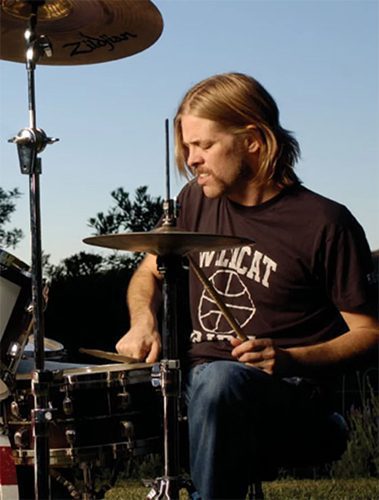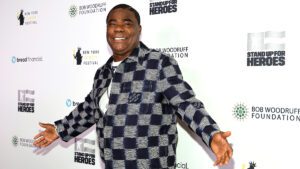
The sudden and tragic death of Taylor Hawkins, the renowned drummer of Foo Fighters, left the music world in shock and mourning. With his infectious energy and extraordinary talent, Hawkins had become a beloved figure in the rock community. Yet, behind his outward vibrancy, a struggle with the demanding nature of touring took its toll on his physical and mental well-being. As friends and colleagues share their insights, a complex picture emerges of a musician grappling with the pressures of fame and the relentless pace of life on the road.
The Toll of Touring
Throughout his career, Taylor Hawkins expressed hesitations about the toll touring took on his overall well-being. In the months leading up to his tragic passing, Hawkins confided in close friends about his concerns and uncertainties. Prior to Foo Fighters’ triumphant return after the pandemic-induced hiatus, the drummer felt hesitant about resuming the rigorous touring schedule. Friends reveal that Hawkins doubted his ability to continue as a full-time member if the band maintained the same pace of relentless touring.
Despite maintaining his physical fitness, Hawkins found the physicality required to play nearly three-hour concerts night after night vexing and exhausting. The demands of the stage, coupled with the extensive travel and constant performance pressure, left him physically and mentally drained. His friends attest to the toll this took on his overall well-being.
For Hawkins, the decision to scale back his touring commitments was not an easy one. Foo Fighters’ status as a massive musical machine with numerous employees and business considerations weighed heavily on his mind. Hawkins was acutely aware of the business side of being part of a band of such magnitude.
Despite expressing his desire to scale back, Hawkins likely agreed to continue touring with Foo Fighters to maintain team unity. His friends recognized the pressures associated with being part of a large machine like the band, which employs numerous individuals. “A band like that is a big machine [with] a lot of people on the payroll,” Cameron explains. “So you’ve got to really be cognizant of the business side of something when it’s that big and that has inherent pressure, just like any business.”
Be that as it may, the delicate balance between artistic aspirations, business obligations, and the well-being of band members is a challenge faced by many successful musical acts.
A Heart-to-Heart with Dave Grohl
Taylor Hawkins had a heart-to-heart conversation with his bandmate and friend, Dave Grohl, regarding his concerns about the demanding touring schedule. Close friends and colleagues reveal that Hawkins expressed his doubts about being able to continue as a full-time member if the band continued to tour at such a rigorous pace. He confided in Pearl Jam drummer Matt Cameron, stating, “He had a heart-to-heart with Dave and, yeah, he told me that he ‘couldn’t fucking do it anymore’ — those were his words.” Hawkins expressed his reservations, but his friends claim that the touring schedule only intensified following their conversation.
Foo Fighters’ representatives deny that Hawkins ever raised these concerns, contradicting the accounts of his friends. They state that there was never a formal meeting or discussion on this topic with Dave and management. Nevertheless, Hawkins’ friends maintain that he genuinely desired a change, though the extent of the shift he requested remains a point of contention.
Struggles with substance abuse
Taylor Hawkins’ life was marked by a period of intense struggle and subsequent recovery. In August 2001, at the age of 29, Hawkins suffered a heroin overdose during a U.K. festival. He slipped into a coma, and his close friend Dave Grohl stood by his side throughout his two-week hospitalization. Upon waking, Hawkins humorously told Grohl to “fuck off.”
The overdose was a turning point for Hawkins. He recognized the destructive path he had been on and embarked on a journey of personal growth and self-improvement. He made efforts to change his lifestyle, reducing his smoking habits and adopting a healthier diet and exercise routine. Hawkins’ recovery was not without challenges; he experienced difficulties with reading and developed a tic as a result of his overdose. However, he saw the experience as an opportunity to learn and grow.
Hawkins’ commitment to his recovery was unwavering. He was determined to alleviate any concerns Grohl may have had about his drug use, ensuring that his friend did not need to worry about his past behavior. He embraced a new passion for mountain biking and even swapped the role drugs had played in his life for this exhilarating outdoor activity.
While Hawkins had survived a harrowing experience, his friends and colleagues believe that he had moved away from recreational drug use in the years leading up to his death. They attest to his dedication to maintaining his sobriety and prioritizing his health. His focus shifted to his music, his family, and his continued pursuit of being the best drummer he could be.
The Plane Incident and Health Issues
In December 2021, Hawkins experienced a significant incident that further compounded his health concerns. Multiple friends disclose that he lost consciousness while aboard a plane in Chicago. News reports from the time referred to him anonymously as “a member of Foo Fighters.” Red Hot Chili Peppers drummer Chad Smith reveals that Hawkins collapsed on the plane due to exhaustion and was treated with IVs for dehydration and related issues. Following the incident, Hawkins confided in Smith, saying, “I can’t do it like this anymore.”
It remains unclear why Hawkins lost consciousness on the plane and whether it directly related to his health issues or exhaustion. When asked to comment on accounts of Hawkins losing consciousness, Foo Fighters’ representatives dismiss the claims as untrue. However, Hawkins’ friends assert that this incident marked a breaking point for him.
Hawkins subsequently expressed his concerns about the demanding touring schedule to Dave Grohl and the band’s management. Smith recalls, “That was one of the straws that broke the camel’s back. After that, he had a real important heart-to-heart with Dave and the management. He said, ‘I can’t continue on this schedule, and so we’ve got to figure out something.'” Foo Fighters and their management deny that Hawkins ever approached them with such concerns, presenting conflicting narratives.
The Tragic End
Taylor Hawkins’ journey took a devastating turn in the final days leading up to his untimely death. After collapsing on a plane in Chicago, his health issues became more apparent. Multiple friends confirmed the incident, describing how Hawkins lost consciousness and required medical attention. However, Foo Fighters’ representatives disputed these accounts.
Tragically, on March 25 2022, Hawkins was found unresponsive in his hotel room in Bogotá, Colombia, where Foo Fighters were scheduled to headline the Estéreo Picnic festival. Paramedics arrived at the scene but were unable to revive him, and he was pronounced dead at the hotel.
A preliminary autopsy provided more questions than answers. The report indicated the presence of marijuana, antidepressants, benzodiazepines, and opioids in Hawkins’ system. Forensic doctors noted that his heart weighed twice the normal size and speculated that it could have collapsed even without the aid of drugs. Official autopsy results are not yet public, leaving the cause of death unknown.
The Consummate Rock Star
Taylor Hawkins embodied the essence of a consummate rock star. As the drummer of Foo Fighters, he seamlessly replicated the drumming prowess of former Nirvana member Dave Grohl while also emerging as a star in his own right. With flawless renditions of Freddie Mercury’s challenging vocal runs on Queen covers, Hawkins showcased his extraordinary talent and versatility. However, his musical journey extended far beyond Foo Fighters.
Before joining the band, Hawkins honed his skills by backing renowned artists like blues rocker Sass Jordan and Alanis Morissette. Throughout his time with Foo Fighters, he delved into various side projects, including Taylor Hawkins and the Coattail Riders, the Birds of Satan, and the covers group Chevy Metal. His pursuit of these projects demonstrated his insatiable desire to explore his full capabilities as a musician.
Taylor Hawkins’ goal was not just to be a member of a successful band but to live and breathe music. His passion for the craft was unwavering, and he constantly sought new avenues of musical expression. Whether it was driving down the highway in a Winnebago, breaking down Ratt songs, or sharing live videos of Genesis, he was always eager to connect with fellow musicians and share his love for the art form.
Throughout his journey, Hawkins remained grounded and unaffected by the trappings of rock stardom. His focus was never on fame or fortune; it was always about the music. He maintained a humble perspective, never forgetting who he was and where he came from. Despite his accomplishments and the numerous legends he had the opportunity to jam with, he carried the joy and excitement of a teenager who had found his true calling.
Conclusion
The tragic death of Taylor Hawkins sent shockwaves through the music world, leaving fans and fellow musicians devastated. His passing left a void that cannot be filled, and his absence will be deeply felt by all who knew and admired him. Through his remarkable drumming skills, incredible vocal range, and unwavering dedication to his craft, Hawkins solidified his place as a true rock icon.
Hawkins’ journey was not without its challenges. He faced personal struggles and battled with addiction, but he always persevered. Overcoming a heroin overdose early in his career, he made a conscious effort to turn his life around. He prioritized his health, embraced sobriety, and focused on personal growth. His resilience and determination were admirable, and he became an inspiration to many who faced similar challenges.
Taylor Hawkins’ impact reached far beyond his role as the drummer for Foo Fighters. He pushed musical boundaries, explored new genres, and collaborated with a wide range of artists. His side projects showcased his versatility and allowed him to express his creativity fully. He proved time and again that he was not just a talented musician but a true artist with a deep passion for his craft.
As we remember Taylor Hawkins, let us celebrate his vibrant personality, immense talent, and unwavering commitment to music. His legacy will continue to resonate in the hearts of fans and musicians alike. He will be remembered as a consummate rock star, a fearless performer, and a beloved friend. The world of music has lost a true legend, but his spirit will forever live on through his incredible body of work and the lasting impact he made on the rock music landscape. Rest in peace, Taylor Hawkins. Your music will continue to inspire and uplift us all.
You may also like:




